
In this best combo guitar amps roundup review, I’ll show you 5 of my favorite picks and tell you why they rock!
Are you looking for an all-tube amp in a combo format? Maybe you need something that sounds great cranked but doesn’t annoy your family members or neighbors. Perhaps your recording studio could use a fresh guitar sound that is organic and easy to dial in.
Do you play small gigs and need an amp that’s portable but potent? Is your guitar getting lost in the stage mix? Let me show you some of the combos that can help you remedy that.
Keep on reading to learn more!
Best Combo Tube Amps – A Quick Look (Updated List)
| # | Quick Look | Product Name | Overall Impression | Relative Cost |
|---|---|---|---|---|
| 1 | 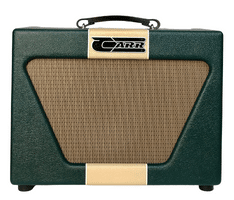 | Carr Super Bee | Best Overall For Blackface Fender Sounds | $$$$ |
| 2 | 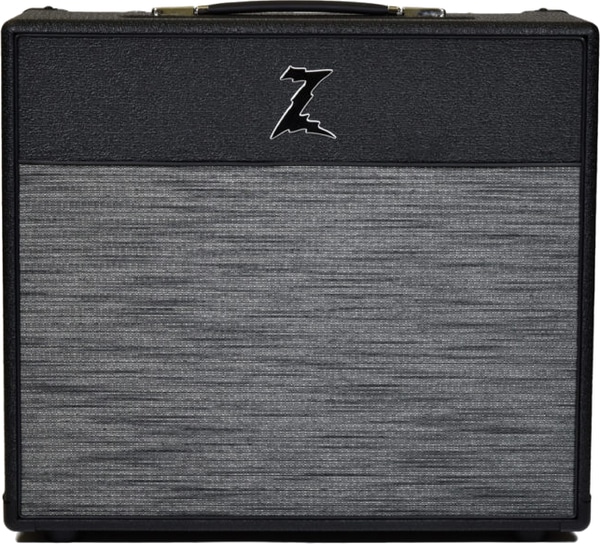
| Dr. Z – Z Wreck Jr | Extremely Versatile With Killer Dynamics | $$$ |
| 3 | 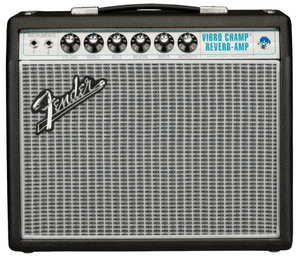 | 68 Custom Vibro Champ Reverb | The Way To Go For Silverface Champ Fans | $$ |
| 4 | 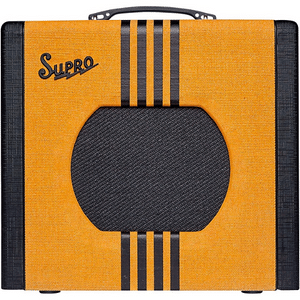 | Supro Delta King 10 | Excellent Headroom And Touch Sensitivity | $ |
| 5 | 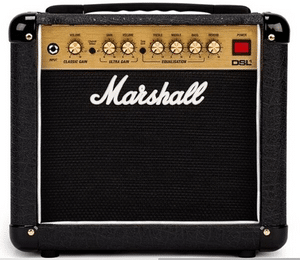
| Marshall DSL1C | Best Buy And Great Marshall Sound | $ |
Combo Guitar Amp Product Reviews
Here are my review summaries for each of the five combo amplifiers. You can read the full review on each amp to get all the details.
1. Carr Super Bee (Best Overall)

The Carr Super Bee is a 10 Watt, all-tube, single-channel amp designed to give you a wide variety of Blackface and early-to-mid CBS Fender sounds in a compact combo configuration.
Its power output can be set to give you the total 10 Watts, or scaled-down, using the adjustable attenuator. No matter how low you set the attenuator, it never changes the tone or dynamics of the sound you originally dialed in.
It features a tube-driven reverb with a spring tank for lush organic sound.
This is the amp I like most in the review. Get one if you treasure simplicity and three Fender-based sounds that will take you from clean to a saturated overdrive and distortion that is totally organic at any volume!

Pros
- STING Control For Three Fender-Based Sounds
- Power Attenuator Can Take The Power Output Down To A Whisper
- Point-To-Point Wiring
Cons
- No Reverb Footswitch (but you’ll never want to shut it off)
- No Effects Loop
- No Channel Switching (single channel for 3 different sounds)
To read the full product review, see Carr Super Bee Review – Classic Blackface Sound On Steroids!
2. Dr. Z – Z Wreck Jr (Versatile And Dynamic)

The Dr. Z Z Wreck Jr 1×12 combo amp is a highly versatile amp that can deliver great sound in any working situation. This 15 Watt beauty gives you the lower power option to its big brother, the 30 Watt Z Wreck.
It packs plenty of punch and can easily be used in a small club scenario without miking into the PA system.
This amp has an incredibly dynamic response and harmonic-rich notes that seem to explode off the tips of the fingers, especially with the master volume turned down, and the volume knob cranked.
If you’re not a “Fender purist,” this combo will give you incredible sounds for any musical genre. You can’t go wrong with a Dr. Z! I love this amp, and Brad Paisley does too!
Pros
- Sounds Great
- Hand Wired
- Has Master Volume Control
Cons
- Pricey
- On The heavy Side
- No Comfort/Speed Switch
To read the full product review, see Dr Z Z Wreck Jr 1×12 Combo Review – Can You Say “Awesome”?
3. 68 Custom Vibro Champ Reverb (“Super-Champ” Sound)

This amp takes the original 5 Watt 68 Vibro Champ to the next level by adding a lush Hall reverb and upgrading the speaker size to 10 inches to beef up the amp’s low-end.
It will give you a big sound covering everything from rock and traditional blues to jazz.
The rest of the amp is true to the original ’68 Vibro Champ spec. I love the all-tube Class-A design that is relatively quiet even at near-saturated levels. It has a solid-state rectifier with less power sag than the vintage silverface Vibro Champ.
The Fender 68 Custom Vibro Champ Reverb is a bit of a one-trick pony, but it nails silverface Champ sounds with enhanced bass and a touch of reverb! If you’re a “Fender Champ Man” (or woman), then check it out.
Pros
- Great Sound
- Enhanced Low End
- Wide-Range Vibrato
Cons
- Vibrato/Reverb Footswitch Not Included
- No effects Loop
- Reverb Is Digital
To read the full product review, see Fender 68 Custom Vibro Champ Reverb Review – Astonishing!
4. Supro Delta King 10 (Touch Sensitive & Great Headroom)

The Delta King 10 is a modern version of the early Supros made in Chicago from 1935 to 1968.
It has a 5 Watt Class A amp with an all-tube signal path and a 10-inch speaker. This low-wattage combo unit offers excellent headroom and touch sensitivity.
If you are looking for the classic vintage ’50s to ’60’s sound in an amp that is versatile enough to handle everything from Led Zeppelin and The Rolling Stones, then check out this Supro!
Pros
- Flexible Sound Options
- Great Touch Sensitivity
- All-Tube Class A Signal Path With Power To Spare
Cons
- Footswitch Not Included
- No Midrange Eq Control
- Can Get A Little Noisy
To read the full product review, see Supro Delta King 10 Review – Great Vintage Class-A Sound!
5. Marshall DSL1C (Best Buy For Rock & Blues Players)

This 1-Watt combo amp could be the best bedroom practice amp ever! At only 14 inches wide and 13 inches high, this little powerhouse produces sounds that you usually don’t get from an 8-inch speaker.
It was designed to be a lower-cost solution for an all-tube combo amp that delivers an authentic Marshall tone.
Like the other DSL amps, it features two switchable channels that give you a variety of classic and high-gain sounds.
Pros
- Great Sound
- Has An Effects Loop
- Footswitch Is Included
Cons
- Reverb Sounds Metallic, Not Organic
- Tone Shift Control Can Scoop Highs
- Speaker Can Sound Small, Especially In 0.1 Watt Setting
To read the full product review, see Marshall DSL1C Review – This Little Amp Will Surprise You!
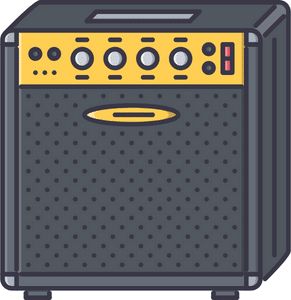
What Are Combo Guitar Amps?
A combo amp is an “all-in-one” unit that comes ready to plug your guitar in and play. It includes a single cabinet that contains the “amplifier” (electronics for the preamp, amp, reverb, etc.) and one or more speakers.
The back of the cabinet may be open or completely sealed, depending on the make and model.
Not All Combo Amps Are Created Equal
Many players think of combo amps as cheaper, low-power alternatives, but they can cater to a boutique market and come in high-volume output ranges. Classic combo amps like the original tweed Fender Champ or Bassman are highly prized for the specific sound they produce.
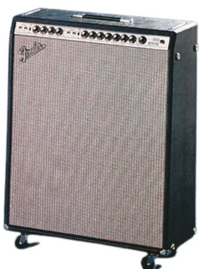
Combo amps are not necessarily lighter or smaller than two-piece amps, which have a separate amplifier “head” and cabinet.
If you ever tried to carry a 100 Watt Fender Quad Reverb combo amp up a flight of stairs, then you know what I mean. The cabinet contains four 12 inch speakers and weighs about 90 pounds.
After you lift this baby a few times, you might be thinking about trading it in for something like a half-stack unit, although I absolutely love mine.
There’s a reason it’s on casters. Also, it is loud enough to take your head off! Albert Collins, “The Ice Man” played through a Quad Reverb amp.
Why Should You Get A Combo Amp?
If you are a beginning player, I recommend that you buy a low-cost combo amp and put most of the money in your budget into a high-quality guitar. This will make it easier for you to learn to play and help you progress faster through each lesson.
Professional guitarists who want a small amp with outstanding sound and playability are more likely to buy “boutique” combo amps. These amps are ideal for recording and small size venues. They can be “mic’ed” through the house PA system to play in larger spaces.

What To Look For When Buying A Combo Amp
Opinions can vary on what’s most important when selecting a combo guitar amp. Here are some things you should consider to help you find the most suitable amplifier for you.
Build Quality
If you plan to use your combo amp strictly for bedroom practice, build quality may be less of an issue. Combo amps that will be called into service for use in “road travel” for gigging should have sturdy cabinet construction and reliable electronics.
Size And Weight
Combo amps come in all sizes and weights. You don’t have to buy a big heavy combo unit to get one that sounds great. If ease of transport is a primary consideration, there are many options available to choose from, from small boutique combos to “lunchbox” amps.
Power Output
The amount of power you need will depend on how the amp will be used. Larger audiences or musical genres like rock or metal will probably require a louder combo amp. Don’t buy a combo amp just because it is loud. Consider other factors like sound quality, weight, and needlessly adding to the cost of your purchase.
Master Volume
A master volume or power attenuator can be vital if you play music that requires the amp to overdrive, distort, sustain, or enhance the harmonics of particular notes. Without a master volume control, the amp can sound unacceptably loud, especially in domestic situations like “late-night” bedroom practice.
Footswitch Jacks
If your combo amp has an on-board reverb or vibrato unit, then a footswitch jack may be essential to allow you to turn them on and off during or between songs.
Multi-channel combo amps with footswitch jacks allow you to quickly change from your rhythm channel to your lead tone when beginning a guitar solo.
If you want a combo amp strictly for bedroom practice, then you can make your adjustments by hand.
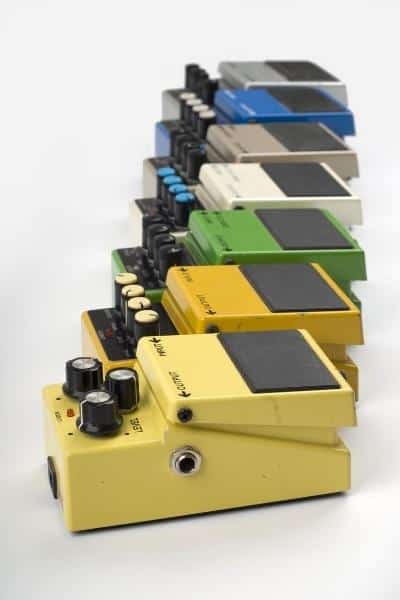
Effects Loop
An effects loop can be useful for connecting time-based effects, like a chorus or delay unit, between the preamp and amplifier stages for higher definition sound. Most high-quality combo amps that don’t have an effects loop are designed to take all types of pedals at the front end, between the guitar and input jack.
Auxillary Jacks
Axillary jacks are helpful for things like using headphones for silent practice and playing over MP3 files of previously recorded music.
An attenuated audio output (line-level) jack can allow you to connect your combo amp to the digital audio workstation (DAW) in your recording studio.
Some combo amps also have speaker output jacks that allow you to connect the amp to larger speaker cabinets for more volume or richer tone.
Cost
The cost of a combo amp can vary significantly. More expensive combo amps are not always better than cheaper ones, especially if they are not the right fit for your particular sound or use.
You can expect to pay a lot more for a boutique combo amp, but generally speaking, you will be getting what you pay for.
Beginning players should consider starting with a cheaper combo amp and upgrading as they progress in their skill level.
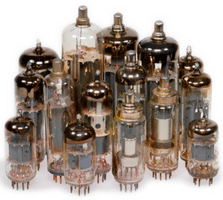
Are “All-Tube” Combo Amps Worth It?
Combo guitar amps come in four basic configurations. They can be classified as all-tube, solid-state, modeling amps, and hybrid (a combination of tube and solid-state or modeling).
An all-tube design usually provides the most organic and touch-sensitive musical experience for the guitar player.
The downside of “all-tube” combo amps is that they tend to be costly and can add weight to the unit.

Decide What You Need Before You Buy
Combo amps are an excellent way for guitar players to get the portability they need without sacrificing sound quality and functionality.
Make a list of your requirements and expectations, and then choose the combo amp in your price range that meets or exceeds all these parameters.

Frequently Asked Questions About Combo Amps
Here are some of the most common questions that players ask me about combo amps.
Can You Use A Combo Amp Live?
Yes, combo amps are great for live playing! They are portable and typically lighter than stacked amps. Be aware of the volume limitations that some comb amps have. If the amp is not loud enough, it can be mic’ed through a PA system to adjust its volume to other band members through the mixing board.
Can You Plug A head Into A Combo Amp?
If you don’t have a separate speaker cabinet for your amplifier head, it is possible to plug it into the speaker(s) in a combo amp if it has a speaker output jack to disconnect the speaker(s) from the unit.
The speaker(s) in your combo amp must have an impedance and power rating that matches the amplifier head to avoid permanent damage to both the head and speakers.

What Is The Best Combo Amplifier For Metal
There are many combo amps available that sound great for playing metal. I tend to favor the Marshall and Blackstar product lines. See my review on the Marshall DSL1C or the Blackstar Fly 3 lunchbox combo for more info.
Should I Get A Combo Amp Or A Head?
The answer depends on your budget and how you will be using the amplifier. If you want something more affordable and portable, a combo amp is a good choice. If you want an amp that can move a lot of air, an amplifier head connected to one or two 4×12 cabinets will easily fill a large room with sound or compete with an aggressive drummer.
If you are a rock or metal player and dream of playing through a “wall of Marshalls” (and who wouldn’t), then go for the full stack! ??
Can I Buy A Combo Amplifier Stand?
If you have a combo amp that you would like to tilt or raise up higher for better sound dispersion and more convenient access to the control panel, several types of guitar amp stands are available. Choose one that will adjust to all your needs and support the weight of your amplifier.

Final Thoughts On Best Combo Amps
This article reviews my picks for the best tube combo amps. Combo amps have the advantage of being “all-in-one” portable units that are easier to transport and come in a range of power outputs for home or commercial use.
There’s a combo amp for everyone. They are an excellent option for beginning guitarists on a budget and professional players that want high-end performance with a boutique sound. The type of music you play will be a major factor in finding the best combo amp for you.
I favor all-tube combo amps for their organic sound and richness of tone. Many solid-state and modeling combo amps also sound great and offer diverse control options. The choice is ultimately up to you!
Related Article ➡ What Size Guitar Amp Do You Need? – Ultimate Guide!
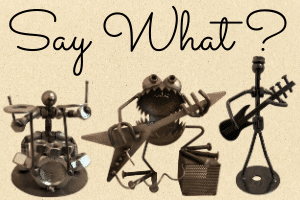
Tell Me What You Think
Please leave a comment below if you enjoyed this combo amp review, have any questions about this product, or want to leave your own review. I will be happy to help you.
- Do you own a combo amp or are you thinking of buying one? Which amp?
- Which amp in this article do you like most and why?
- Do you prefer an all-tube combo amp another type? Why?
- After reading this article are you thinking about buying or trying one of the 5 amps I reviewed? Which one?




I am actually in the market for guitar combo amps as my son has developed an interest in the guitar. There are four areas that I would be most concerned with. Power, quality of sound, price (appreciating your caution of a boutique market), and aesthetics. You have provided a good comparison between the alternatives however for me the Marshall DSLC fits the bill best for my decision factors. The drawbacks of a metallic versus organic tone I think my son can live with as well.
Hi, Hugh
Thank You for your comments!
I was referring to the reverb quality on the DSL1C, which is digital, not tube-driven analog. All in all, the reverb sounds fine, and I think your son will really enjoy this amp, especially if he is a beginning player!
The entire line of Marshall DSL (Dual Super Lead) amps are fantastic, and the 1 Watt DSL1C is a steal for the money. I got my first Marshall JTM 45 (30 Watt) half-stack when I was in high school way back in the 1970s. It was the only Marshall amp in the music store, which took the owner forever to get from Bletchley, England.
It cost over $1,000 back then! I put a deposit down on it and had to pay it off in full within a month to get him to hold it for me. Now, I own eight Marshall amps, but that one is still my favorite.
I have other amps as well, including Fender, Mesa Boogie, Orange, Vox, Laney, Line-6, etc., but I always come back to the sound of Marshall as one of my favorites!
Take Care,
Frank
My bandmates and musician friends used to be quite snobby towards combo amps, but I’ve noticed that over time, almost all of them have switched to combo amps both for playing at home and for taking to their gigs. You can’t argue with the simplicity that they offer, so it’s nice to see that there are great options that don’t sacrifice sound for convenience.
My bandmates have really been digging the Goodsell combo amps, but you’ve mentioned a couple of brands I haven’t heard of before that sound like they are worth a try. Thanks for the review!
Hi, Aly
Thank You for your comments!
Yes, “stacked” amps are always too cool to look at! I remember first seeing Jimi Hendrix and Eric Clapton rocking a “wall” of Marshalls! In reality, there’s a combo amp for every type of musician and use.
I have been meaning to try out a Goodsell combo, which Richard apparently sells on his Reverb.com store. I’m waiting for a used one to come into the Guitar Center, but I guess they are too good to part with and in short supply. How would you rate them compared to the best amp you have ever heard or owned?
They look a lot like some of the Fender tweed amps from the outside, but the electronic designs are another story.
If I buy one or get an opportunity to play through a Goodsell, I’ll definitely review it on my website.
Thanks for stopping by & I hope you will come back again!
Frank